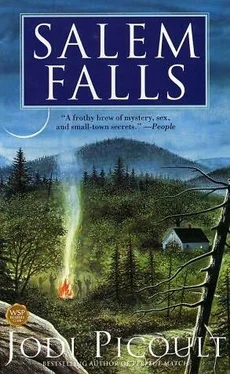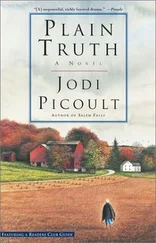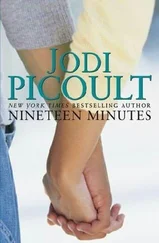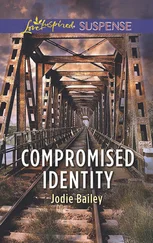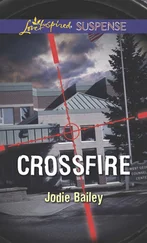This Jack St. Bride was a different man than the one who had come through the door two months ago in protective custody. His face was a blank wash of expression, like every other prisoner rotting in his cell. He shrugged out of his civilian clothes like a snake giving up its skin, as if he knew that it wouldn’t fit him in this next stage of his life. Through the violation of the cavity search, Jack closed his eyes and did what he was told.
It didn’t matter anymore, none of it. He’d seen the faces of the men and women on that jury-the way they’d cried along with Gillian Duncan, the slanted looks they knifed at him that they thought he surely could not feel. He’d watched his own attorney leave the courtroom, headed home to his own life-one that didn’t factor in the innocence or guilt of Jack St. Bride and that wouldn’t change, no matter what verdict was handed down.
Jack fell into step beside the guard and walked, docile as a fawn, toward his cell. Get used to this, he thought.
He might not yet have been sentenced, but it was only a matter of time.
“Oh my God,” Gillian said, sitting up on her bed the minute Meg opened the door of the bedroom. “You have no idea how glad I am to see you.” The door cracked open a little wider, and Gillian saw her father standing behind her Meg. “Daddy,” she said, startled.
His eyes were dark, hooded. “I didn’t know if you were up to a visit.”
“I am,” Gillian said quickly. “Really.” She grabbed Meg’s hand and yanked her inside, then waited for her father to close the door and leave them in privacy.
It was, Meg thought, as if their fight about the drugs in the thermos had never happened. Gillian fluttered around her like a gypsy moth, buzzing about the trial and the witnesses and who had said what. “You have no idea how much I want to talk to Whit and Chelsea,” she chattered. “But I’m sequestered, in case I need to be recalled by one of the lawyers later. Still, I heard that Whit was peeing in her pants. And that Thomas’s father was a total prick to Chelsea.”
“That’s his job,” Meg said, her mouth dry.
Gillian stepped in front of her. “What’s been said about me?”
“Nothing.”
“Oh, right. You haven’t been on the stand yet. Do you think you’ll be called tomorrow? It’s not so bad, really. One of the jurors has the most disgusting mole on the side of her neck. I swear I couldn’t stop looking at it the whole time-”
“I’m not testifying,” Meg mumbled.
“You’re not?”
She shook her head. “Mr. Houlihan, he changed his mind.”
Dumbfounded, Gilly stared at Meg. “If this is something you’re pulling because of that atropine . . .”
“Jesus, Gilly . . . does everything have to be about you?” Meg turned away, mortified. “He touched me,” she confessed. “He put his hands all over me, Gilly. I remembered.”
Beside her, Gillian stood like a stone sentry. “He did not.” She raked angry eyes over Meg’s disheveled form, her double chin, her dimpled arms. Her nostrils flared, once.
“Then why do I remember it?” Meg cried. “Why can I feel his hands on my-”
“No!” Gillian slapped her so hard Meg’s head snapped back and the red-pencil print of a hand stamped her cheek. Tears ran down Meg’s face, and her nose was running, and she couldn’t manage to hold onto a single thought. “He did not touch you,” Gillian said. “Do you understand?”
Meg nodded quickly.
“He touched me.” Gillian grabbed Meg’s arm and squeezed it. “Say it!”
“He touched you,” Meg sobbed.
“Good,” Gillian said, the fierce fire in her eyes banking. She reached for Meg, cradling her friend against her chest, wrapping her tight in her arms. She stroked Meg’s cheek until the red print faded, then leaned down and pressed a kiss to her damp skin. “That’s right,” Gillian whispered. “Don’t forget.”
The jury was sluggish the next morning, something not helped by the first witness-a retired FBI soil analyst older than Methuselah who used far too many chemical terms to explain that the dirt found in the treads of Jack’s boot was consistent with the known soil sample taken from the crime scene. By the time the prosecutor put his forensic scientist on the stand to explain DNA, Jordan almost felt sorry for him. Would the judge declare a mistrial if the entire jury went into a coma?
But Jordan had been counting on a typical DNA scientist-a brainy geek with a receding hairline and a technical vocabulary. What he got instead was Frankie Martine.
She easily could have moonlighted as a Playboy model, with her bee-stung lips and long blond hair and hourglass figure. Jordan glanced at the jury and wasn’t surprised to find them all sitting up, listening. Hell, she could have recited a grocery list, and the six men in that box would have given her their undivided attention.
“You get half of your DNA from your mother, and half from your father,” Frankie said. “You know how people say, ‘Oh, I’ve got my mom’s nose . . . or my dad’s chin.’ In the same manner, we inherit thousands of genetic traits that mean nothing to anyone but us geeky forensic scientists.” She smiled at the jury. “You with me?”
They all nodded. And the jury foreman, a bald man with a protruding belly, winked.
Surely he’d imagined that. Jordan did a double take as Frankie Martine continued, unfazed. “For example, the average Joe doesn’t know that he’s CSF1P0 type twelve, thirteen . . . yet that’s something that could come in handy if he’s ever accused of a crime and the perp leaves behind DNA evidence of being CSF1P0 type ten, eleven.”
Jordan glanced at the jury box and nearly fell off his seat as the jury foreman winked again at the witness.
“Objection,” he said, standing up.
Matt Houlihan looked at him as if he were crazy, with good reason. Nothing Frankie Martine had said was objectionable.
“On what grounds, Mr. McAfee?”
He felt heat creeping up from his collar. “Distraction, Your Honor.”
The judge frowned. “Get up here, counsel.” Jordan and Matt approached the bench, hesitating at the scowl on the justice’s face. “You want to tell me what you’re up to now?”
“Your Honor, I believe that the witness is distracting certain members of the jury,” Jordan said in a rush.
“Which members?”
The ones with Y chromosomes, Jordan thought. “The foreman, in particular. I think Ms. Martine’s physical attributes have, um, caught his eye.”
Matt Houlihan started to laugh. “You have got to be kidding. The witness is a professional forensic scientist.”
“She’s also quite . . . attractive.”
“What do you want me to do? Have her testify with a paper bag over her head?”
“The foreman keeps winking at her,” Jordan said. “I have reason to believe that he’s not concentrating on the task at hand.”
“Why does this happen in my court?” The judge sighed. “I will not stand for you talking about the witness this way, Mr. McAfee. Even if you can’t get your own mind out of the gutter, I have faith that the members of our jury can. Your objection is overruled.”
Jordan slunk back to his seat. The prosecutor approached his witness, shook his head, and continued. “Ms. Martine, why is DNA used to profile evidence?”
“Let me put it in simple terms,” she said. “You’re driving to work and you’re side-swiped by another vehicle. When you call to make a police report, they ask you to describe the car. The more information you give them, the more likely they’ll be able to track down the exact car. So, if you tell the police only that the car was blue, well, it’s not very helpful to their search, since there are blue trucks, blue cars, blue vans, of all makes and models. However, if you tell them that it was a blue Acura 1991 hatchback, with a sunroof and a SAY NO TO DRUGS bumper sticker, the easier it will be for them not only to find a car matching that description but also to determine that it was indeed the car that side-swiped you. The more characteristics you give, the smaller the pool of suspect cars becomes.
Читать дальше
